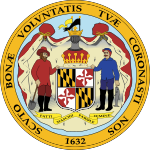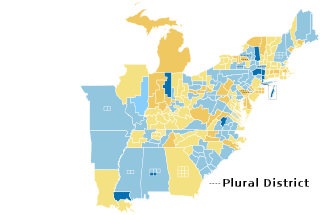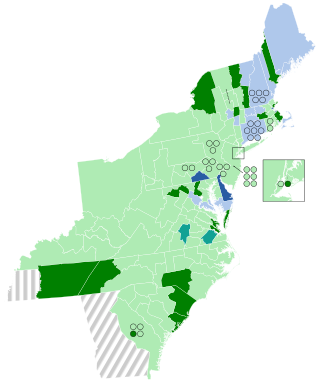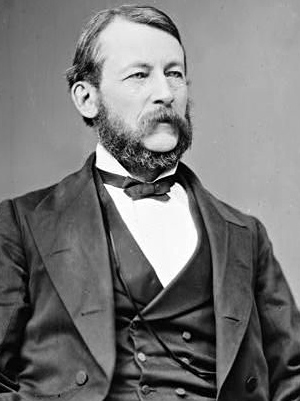A special election was held in Maryland's 7th congressional district on September 27 and October 4, 1806 [1] to fill a vacancy left by the resignation of Joseph H. Nicholson (DR)
| Elections in Maryland |
|---|
 |
A special election was held in Maryland's 7th congressional district on September 27 and October 4, 1806 [1] to fill a vacancy left by the resignation of Joseph H. Nicholson (DR)
| Candidate | Party | Votes [2] | Percent |
|---|---|---|---|
| Edward Lloyd | Democratic-Republican [3] | 1,237 | 83.8% |
| James Brown | Quid | 240 | 16.2% |
Lloyd took his seat in the 9th Congress on December 3, 1806, two days after the start of the 2nd session of the 9th Congress [4]

The 1900 United States House of Representatives elections were held for the most part on November 6, 1900, with Oregon, Maine, and Vermont holding theirs early in either June or September. They coincided with the re-election of President William McKinley. Elections were held for 357 seats of the United States House of Representatives, representing 45 states, to serve in the 57th United States Congress. Special elections were also held throughout the year.

The 1840–41 United States House of Representatives elections were held on various dates in various states between July 6, 1840, and November 2, 1841. Each state set its own date for its elections to the House of Representatives, before or after the first session of the 27th United States Congress convened on May 31, 1841. Elections were held for all 242 seats, representing 26 states.

The 1806–07 United States House of Representatives elections were held on various dates in various states between April 29, 1806 and August 4, 1807. Each state set its own date for its elections to the House of Representatives before the first session of the 10th United States Congress convened on October 26, 1807. They occurred during Thomas Jefferson's second term. Elections were held for all 142 seats, representing 17 states.

The 1804–05 United States House of Representatives elections were held on various dates in various states between April 24, 1804, and August 5, 1805. Each state set its own date for its elections to the House of Representatives before the first session of the 9th United States Congress convened on December 2, 1805. The elections occurred at the same time as President Thomas Jefferson's re-election. Elections were held for all 142 seats, representing 17 states.

The 1800–01 United States House of Representatives elections were held on various dates in various states between April 29, 1800, and August 1, 1801. Each state set its own date for its elections to the House of Representatives before the first session of the 7th United States Congress convened on December 7, 1801. They were held at the same time as the 1800 presidential election, in which Vice President Thomas Jefferson, a Democratic Republican, defeated incumbent President John Adams, a Federalist. Elections were held for all 105 seats, representing 15 states.
California's 9th congressional district is a congressional district in the U.S. state of California. Josh Harder, a Democrat, has represented the district since January 2023.
The 8th congressional district of Tennessee is a congressional district in West Tennessee. It has been represented by Republican David Kustoff since January 2017. The district appears rural on a map, but the bulk of its vote is cast in the suburban and exurban areas around Memphis, such as Germantown, Bartlett, and Collierville, as well as Fayette and Tipton counties. This area boasts some of the highest median incomes in the state.

John Adam Kasson was a nineteenth-century lawyer, politician and diplomat from south-central Iowa. Elected to the U.S. House six times, he repeatedly interrupted his congressional service to serve in the Diplomatic service in many different capacities.

The 1802 United States House of Representatives elections in New York were held from April 27 to 29, 1802, to elect 17 U.S. Representatives to represent the State of New York in the United States House of Representatives of the 8th United States Congress.

The 1804 United States House of Representatives elections in New York were held from April 24 to 26, 1804, to elect 17 U.S. Representatives to represent the State of New York in the United States House of Representatives of the 9th United States Congress. At the same time, a vacancy was filled in the 8th United States Congress.

The 1806 United States House of Representatives elections in New York were held from April 29 to May 1, 1806, to elect 17 U.S. Representatives to represent the State of New York in the United States House of Representatives of the 10th United States Congress.

The 1808 United States House of Representatives elections in New York were held from April 26 to 28, 1808, to elect 17 U.S. Representatives to represent the State of New York in the United States House of Representatives of the 11th United States Congress. At the same time, a vacancy was filled in the 10th United States Congress.

The 1810 United States House of Representatives elections in New York were held from April 24 to 26, 1810, to elect 17 U.S. Representatives to represent the State of New York in the United States House of Representatives of the 12th United States Congress. At the same time, a vacancy was filled in the 11th United States Congress.

The 1816 United States House of Representatives elections in New York were held from April 23 to 25, 1816, to elect 27 U.S. Representatives to represent the State of New York in the United States House of Representatives of the 15th United States Congress. At the same time, a vacancy was filled in the 14th United States Congress.
A special election was held in Pennsylvania's 1st congressional district on November 27, 1806, to fill a vacancy left by the resignation of Michael Leib (DR) on February 14, 1806.
A special election was held in North Carolina's 7th congressional district on February 1, 1808. In the 1806 elections, John Culpepper (F) had defeated incumbent Duncan McFarlan (DR), but McFarlan contested the election, and, on January 2, 1808, the House Committee on Elections declared the seat vacant.
A special election was held in South Carolina's 6th congressional district June 1–2, 1807 to fill a vacancy left by the death of Levi Casey (DR) on February 3, 1807.

A special election was held in Maryland's 7th congressional district to fill a vacancy left by the resignation of John Brown (DR) to accept a position as clerk of the county court of Queen Anne's County. Brown had earlier been re-elected to the 12th Congress, thus, his resignation created vacancies in both the 11th and 12th Congresses. Unusually, a single ballot was used for both vacancies. This was the first of at least three examples of this sort of dual-vacancy being filled with one ballot.

A special election was held in Maryland's 4th congressional district on October 1, 1810 to fill a vacancy in the 11th Congress left by the resignation, on May 14, 1810, of the previous incumbent, Roger Nelson (DR). This election was held at the same time as the general election for the 12th Congress.